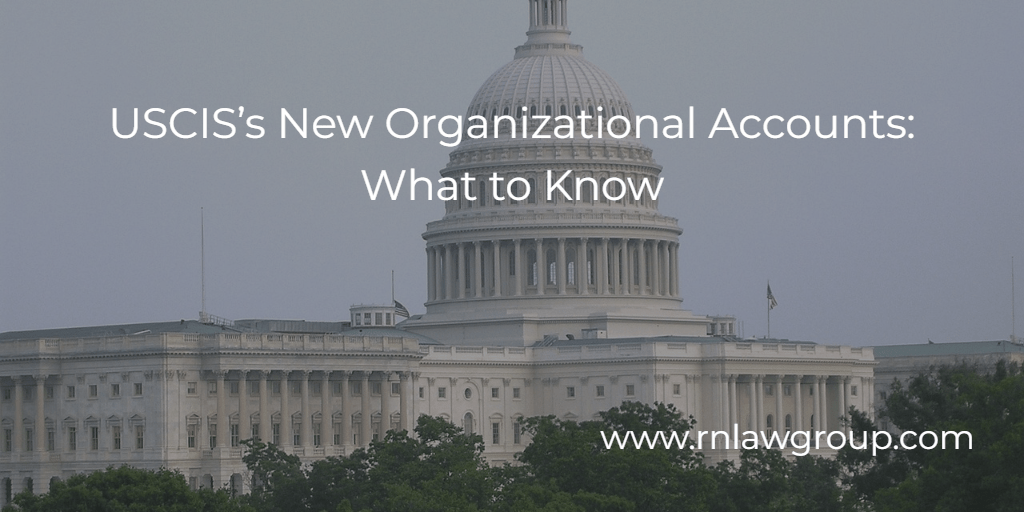
USCIS’s New Organizational Accounts: What to Know
In January, USCIS announced it would launch new organizational accounts that will enable petitioners and attorneys to file certain I-129 petitions and I-907 premium processing requests online. So far, USCIS has accepted these form filings in paper, by mail only, and USCIS has clarified that paper filing will still be available (online filing is optional).
USCIS has held informational sessions to introduce the accounts to employers and legal representatives, and recently announced that the accounts will go live and be available for use by February 28, 2024, at noon EST.
What the Accounts Can Do
- The main benefit of the organizational account is that it will allow, for the first time, H-1B petitions and associated premium processing requests to be filed online.
- Forms can be e-signed by the company representative and attorney, rather than requiring handwritten signatures.
- E-filing will also allow for same-day receipt of petitions, whereas current paper filing always requires at least one day for mail or courier delivery at service centers.
- The accounts will provide a platform through which companies and attorneys can “collaborate” on form preparation and submission.
- Company groups will be composed of “administrators” who have authority to e-sign forms, pay filing fees, and submit petitions; and “members” who will have access to forms but will not be able to sign, pay, or file. A company group may consist of more than one administrator and multiple members.
- Legal teams will consist of attorneys and paralegals, and will be linked to company groups they represent. Attorneys and paralegals may only be a member of a single legal team.
- Forms can be initiated and edited by members of the company groups or legal teams.
- According to USCIS statements so far, the organizational accounts will save enough information to autofill G-28 forms with company and legal representative information.
- Supporting documents can be uploaded electronically to accompany the petition (up to 12MB in size).
- Unsolicited evidence can be uploaded to the portal for consideration after a petition is filed, without the need to await a Request for Evidence first.
What the Accounts Cannot Do
- At this time, the accounts cannot be used to file any other type of I-129 petition – their use is limited to H-1B petitions only.
- Accompanying applications for H-4 dependents or H-4 spouse EADs cannot be concurrently filed online. I-539 and I-765 applications would need to be separately filed by paper with a copy of the H-1B receipt notice.
- Paper-filed I-129 petitions cannot be upgraded to premium processing using the online I-907 form; paper I-907 requests will still need to be mailed to the service center if the I-129 petition was filed by mail.
- It appears the account will save only enough information to auto-populate G-28 forms. USCIS representatives have not stated whether company and/or attorney information will auto-populate in the I-129 form. They have confirmed that beneficiary information will not be saved in the portal.
- The organizational accounts cannot be synced to 3rd-party form generation software used by most preparers.
- The pay.gov system that will be used for payment of filing fees limits each credit card to charges of $39,999 per day.
The H-1B Lottery Online Registration
The organizational account platform will also be used for this year’s online registrations for the H-1B lottery, scheduled to take place March 6-22. Anyone with a previous “H-1B Registrant” account in the myUSCIS portal will have their accounts automatically converted to an organizational account when the platform goes live on February 28. Login information should be the same, and when the registrant signs in on or after February 28, they will be prompted to designate as an “administrator” of the company. Administrators can then invite their legal representatives to link to their account, or accept invitations from their legal representative.
Takeaways
While electronic filing is a valuable endeavor, and can be useful in an emergency filing situation, the current platform as described by USCIS lacks many features that frequent preparers and filers of H-1B petitions seek. In particular, the inability to sync the account with private form-preparing software makes drafting the application on the platform more labor intensive, as petitioner and beneficiary data must be manually entered for each application. The inability to concurrently file with H-4 dependents’ I-539 or I-765 applications means many petitions will be filed by mail, so that H-4 family members will have the benefit of concurrent adjudications with the H-1B beneficiary. And with the filing fee increases that are scheduled to take effect April 1, the credit card maximum charge could limit some organizations to filing no more than three new employment or change of employer H-1B filings per day (if they are subject to the additional $4000 fee and are requesting premium processing). Furthermore, limiting account users to a single legal team or company group prevents employees from working on multiple petitions within their firm.
Tech Talks
USCIS will be holding further tech talks in February to review use of the organizational accounts. It will also host a session on February 21 regarding the March electronic registration process, which is expected to include further information about the use of organizational accounts, as they will be mandatory for this year’s lottery registrations.
By: Rebecca Chen
Rebecca Chen is a Partner at Reddy & Neumann. Her representation includes advising clients throughout the non-immigrant and immigrant visa application process, from initial filing, responding to various requests for evidence, and processing at overseas consulates. Her years of experience in the immigration field have made her a knowledgeable resource for complex business immigration matters.

